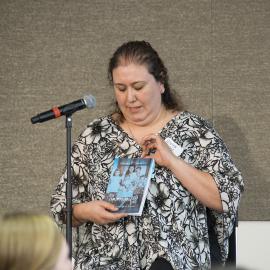Connections and Community: Elvira Prieto's "An (Im)possible Life"

Joy Leighton / Stanford University
If you ask Elvira Prieto, ’96, her secret to publishing a book for the first time while juggling her full-time job and—she laughs—her other full-time job, she'll tell you: “Quite honestly, I usually have to sleep less.” Prieto is the associate director of El Centro Chicano y Latino and resident fellow at Casa Naranja, which means she spends most of her time on campus, her door perpetually open.
She published her volume of true stories in prose and poetry, An (Im)possible Life: Poesia y Testimonio in the Borderlands, in October 2015, after eight months of revising, compiling, editing, and fundraising—and more than ten years of writing, speaking, and connecting with audiences who clamored for more.
For most of that time, the future pieces of Prieto's book stayed in a binder she carted with her to readings. And before that, well—“I didn't intend for anybody to see it! It was hard just to get it out on paper,” she says.
She wrote about her family's experiences as agricultural laborers, about her fraught relationship with her father, and about growing up around abuse and alcoholism as way to recover from residual trauma. But what started as self-care soon became another way to help others. Prieto's first reading at an open mic night ten years ago received such a strong reaction that she knew her stories could reach further.
Finally, “last year, one of my former students sat me down and said, 'Okay, I see you carrying around this binder with all your stuff, going to do these readings. Everybody always asks, where's the book. I'm going to help you. We need to sit down and go ahead and get this done.'”
Another former student designed the volume, Prieto's siblings and mentor read her drafts, her sister copy-edited, and a crowd-funding campaign raised funds to make the project a reality. The self-publishing route allowed Prieto to move quickly and remain in charge of the project, and the community effort, she says, “[felt] very close to home. And it's a good feeling.”
That process is just one way that Prieto's work at Stanford is deeply connected with her emerging writing career. “To me, [writing is] who I am. This is a part of my creative process that makes me feel whole. And I'm bringing every part of myself into my work,” she says. “So much of storytelling is a way to connect with folks.”
That wholly integrated presence is exactly what Prieto tries to inspire in her students. It's what she found at El Centro as a student herself, when her current role was one she dreamed of filling one day, and she strives to pass that on, to make El Centro “a place where [students] can be supported and engaged to be the best of themselves, in every part of themselves, not just their brain but also their heart and their spirit.” Prieto's book, offering her history and her healing to her readers, is one of the efforts in that pursuit.
If you ask Prieto where she finds the energy to bring so much of herself to her work, she divulges her secret freely: the ocean, where her poodle-terrier mix Luna loves to play in the sand. And, characteristically, she won't just tell you the name of the beach she goes to. She'll give you driving directions.


